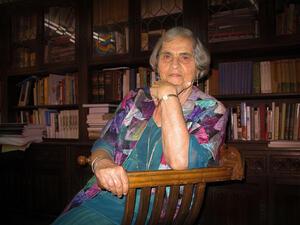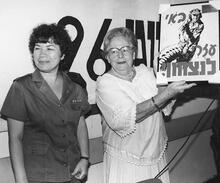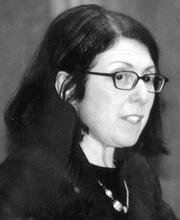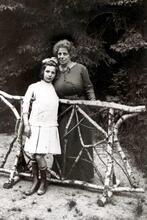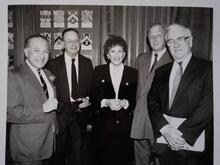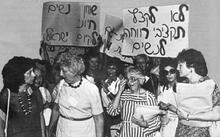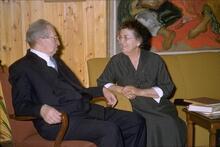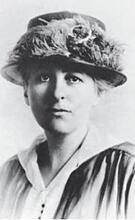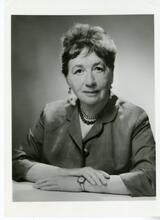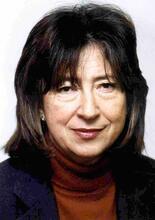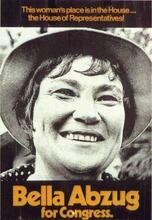Ruth Ben Israel
A renowned expert in Israeli labor law, Ruth Ben Israel drafted the legislation for Israel’s minimum wage and equal opportunity laws. After her discharge from the Israel Defense Forces in 1951, she studied in Paris, returning to Israel in 1954 to create the Meshakem carpet company. When her husband was elected to the Knesset, she studied law to carry on his labor law work. She completed her law PhD and began teaching law at Tel Aviv University, serving as dean of the law faculty in 1990-1991. Many of Ben Israel’s books became essential reading for law students in Israel. She worked with the Knesset to create a variety of labor laws and with its Committee on the Status of Women to help draft sexual harassment laws.
Ruth Ben Israel was an expert in labor law, social equality, social security, and the status of women. Ben Israel received the Israel Prize for legal research in 2001, becoming the third member of her family to win this distinguished award, alongside her brother, Professor Yuval Ne’eman (1925-2006, Israel Prize 1969) and her cousin, Professor Hayyim Harari (b. 1940, Israel Prize 1989).
Family and Education
Ben Israel’s forebears include Israel Bak (1797–1874), who settled in Jerusalem’s Jewish Quarter in 1837. One set of grandparents, Abba (1872–1960) and Sarah Ne’eman, were among the founders of the first Hebrew city, Tel Aviv, while the others, Zareh and Yokheved Mosheli, were among the founders of Neve Zedek, the first Jewish neighborhood in Jaffa.
Ruth Ben Israel was born in 1931 in Egypt to Gdalia and Zipora Neeman. Her family returned to Palestine in 1935 and she grew up in Tel Aviv. In 1949 she joined the Israel Defense Forces, serving as a squad commander, later becoming an officer and serving in various commands. She served for about a year at the Women’s Corps training base and for a further year in the navy as an officer in its Women’s Corps and as the deputy commander of the Stella Maris base in Haifa.
Upon her discharge in 1951, Ben Israel traveled to France, where she studied at the School for Applied Arts in Paris and also earned a diploma in French language and culture from the Sorbonne. She completed her studies in 1954 and worked in the arts after her return to Israel, establishing the Meshakem carpet company, which opened branches in Dimonah and Ofakim.
Legal Career
Ben Israel’s professional shift to the field of law came about almost by chance when her husband, attorney Gideon Ben Israel (1923-2014), retired from his law practice upon being elected to the fourth Lit. "assembly." The 120-member parliament of the State of Israel.Knesset in November 1959. Ruth Ben Israel, who was by this time the mother of two daughters, Marit and Savyon, began to study law at the Hebrew University of Jerusalem in order to carry on the practice, choosing to specialize in labor law since her husband dealt with labor relations in professional unions. While Gideon was secretary of the Workers’ Council and a member of the Histadrut’s coordinating committee, Ruth decided to concentrate on the academic aspect so that there would be a common topic in their work. She obtained both her LL.B. and LL.M. degrees magna cum laude and in 1975 also completed a Ph.D. degree. In 1977 she joined the academic staff of the law department at Tel Aviv University, becoming a full professor in 1986 and professor emerita in 2000. She served as associate dean of the law faculty from 1985 to 1990 and as dean in 1990–1991.
Since 1978 Ben Israel has written the volume on Israeli labor law published by the International Encyclopaedia for Labor Law and Industrial Relations. In 1983 she was a visiting professor at New York University’s law school, and she became has been a member of the American Arbitration Association in 1974. From 1985 to 1995 she was a member of the international board of the International Labor Law and Social Security Association (ILLSSA). Between 1992 and 1998 she was a member of the international board of the International Industrial Relations Association (IIRA).
Ben Israel published more than fifteen books in Israel and abroad and dozens of essays on labor law and social security. Her books have become basic texts on labor law in Israel. In addition to her academic work, Ben Israel served on a voluntary basis for eight years as the legal advisor to the Knesset’s Labor and Welfare Committee, headed by MK Ora Namir. As part of her work in this position, Ben Israel was involved in drafting several important laws, including the Minimum Wage Law and the Equal Opportunities Law. She worked with the Knesset’s Committee on the Status of Women, participating in the preparation of several additional laws, including the law against sexual harassment. Ben Israel represented Israel’s employee union on the Knesset Finance Committee during discussions on raising women’s retirement age. She was the only member who opposed the committee’s recommendation, arguing that as long as there is no gender equality in the employment market, raising the retirement age will gravely harm women, especially those of a lower socio-economic status.
Recognition and Retirement
When Ben Israel received the Israel Prize in 2001, the judges—Professor Yizhak Zamir, the committee chairman, and Professors Sinai Deutsch and Ruth Lapidot—cited the fact that Ben Israel was not only a world-renowned expert famed for her profound research and value-based writings, but also that she had done a large amount of practical work in the field. The judges also noted her book on collective agreements, her research on the right to strike in Israel and in the world, and her book on equal opportunity and the prohibition against discrimination in the workplace—all examples of her in-depth and wide-ranging writing, which combines much knowledge of various legal methods with a profound understanding of legal process and the social problems it seeks to solve.
Ben Israel viewed academic writing as the main part of her professional activity. She believed strongly in the welfare state and felt her writing on this topic was a tool that could be used to mold the law in accordance with her own world views and with her value-based perception of law as a tool for advancing both the individual and society.
In 2005 Ben Israel retired from her legal and academic work. She studied art and painting and published a comic book, illustrating biblical stories.
Ruth Ben Israel died in Israel on February 1, 2020 In her eulogy, Professor Nili Cohen described Ben Israel as a lover of life and people, a lover of her family, of culture, of Israel.
Ben Israel, Ruth. “Hagadat Ruth,” Accessed December 10, 2021,
https://rutbenisrael.wordpress.com/
Cohen, Nili. “Eulogy,” February 2, 2020, Accessed December 10, 20201,
https://upload.wikimedia.org/wikipedia/he/7/73/%D7%A8%D7%95%D7%AA_%D7%9…
Cohen, Omer. “Grandma, get to work? members of the committee for women’s retirement age just wanted to save money and save and save.” Davar, last modified October 10, 2016, https://www.davar1.co.il/36477/
“Goodbye: Ruth Ben Israel passed away, she received the Israel Prize, and was notable advocate of legal law.” Davar, last modified February 1, 2020, https://www.davar1.co.il/208073/
Petition to the High Court of Justice:
HCJ 9134/12 Prof. Moshe Gavish, Prof. Mordechai Segev, Prof. Asa Kasher v. The Knesset, Minister of Finance, Attorney General, Technion – Israel Institute of Technology (2014) (Isr.)
https://versa.cardozo.yu.edu/sites/default/files/upload/opinions/Gavish…
“Prof. Ruth Ben Israel,” The Bauchmann Faculty of Law, Tel Aviv University, Accessed December 10, 2021,
https://law.tau.ac.il/pass/RuthBenIsrael
“The Public Committee for the Retirement Age of Women’s Report,” Accessed December 12, 2021,
https://www.prisha.co.il/UserFiles/File/pdf/research/gilreport.pdf

